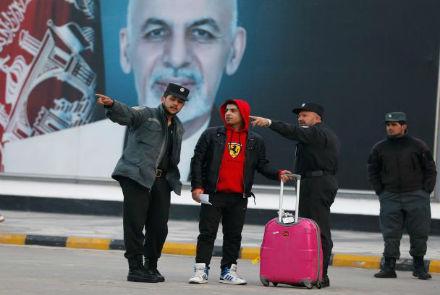A group of 38 Afghans arrived in Kabul from Germany on Thursday, the first group to be deported under an agreement reached between the two countries this year, following the rejection of their applications for asylum.
Thousands of Afghans joined asylum-seekers from the Middle East and elsewhere entering Europe from 2015, and became the second biggest group of asylum seekers in Germany in 2016 after Syrians, according to German data.
A charter plane carrying the Afghans, all men, arrived in the Afghan capital from Frankfurt, a Reuters journalist at Kabul's airport said.
"It was early morning and I was sleeping when four policemen came to my home and arrested me," said Ali Madad Nasiri, who said he had been living in Germany for three years.
"I didn't have a chance to take my clothes, cellphone and laptop - all left behind," he told Reuters while carrying a small bag containing a few belongings.
The deportations are taking place under an agreement reached with Afghanistan in October, a spokeswoman for Germany's Interior Ministry said earlier.
But the deal has sparked protests in Germany in recent weeks with critics saying much of Afghanistan was not safe and the returnees might face reprisals.
On Wednesday a group of demonstrators gathered at the Frankfurt airport in protest over the deportations.
They carried signs reading "Afghanistan is not safe" and "We are Hindus. No deportation to Afghanistan."
"This deportation is irresponsible. Afghanistan is not safe. It is absolutely unclear what will happen to these people once they landed in Kabul. Why is the German government, why is parliament deciding tomorrow to extend the stay of German troops in Afghanistan? They want to prove their point here at all costs," said Guenter Burkhardt, chairman of "Pro Asyl", one of the biggest organizations fighting for the rights of asylum seekers in Germany.
The Afghan Ministry of Refugees will help returnees get back to their homes, a ministry spokesman said, adding that about 10,000 Afghans had returned from Europe this year.
The next plane sending Afghans home had been chartered for early January, according to German media.
More than a million migrants from the Middle East, Africa and elsewhere have arrived in Germany since the beginning of 2015, prompting concerns about security and integration.
The influx has boosted support for anti-immigrant groups such as the Alternative for Germany (AfD) party.
Last week, Chancellor Angela Merkel's Christian Democrats toughened their tone on migrants and Deputy Finance Minister Jens Spahn said the legal barriers to deportation must be lowered.
Afghanistan's Western-backed government is battling militants who have stepped up attacks since the withdrawal of most foreign troops in 2014.

